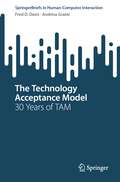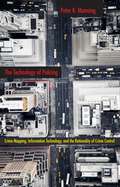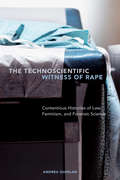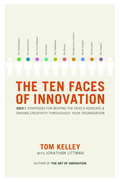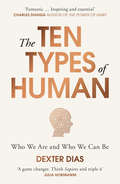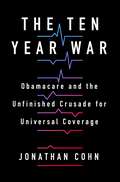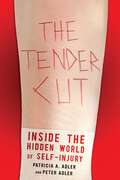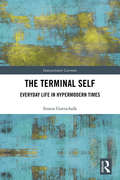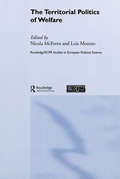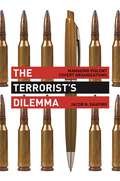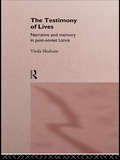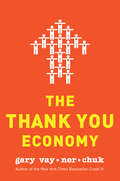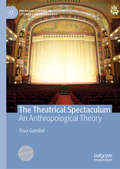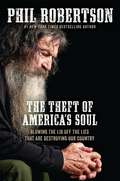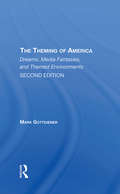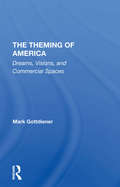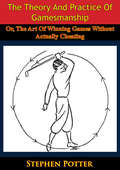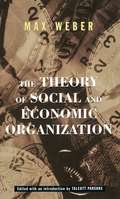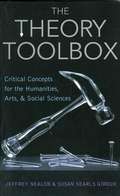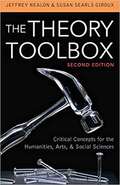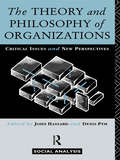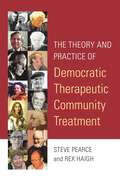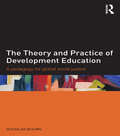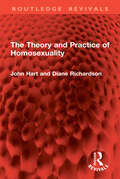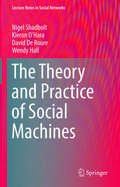- Table View
- List View
The Technology Acceptance Model: 30 Years of TAM (Human–Computer Interaction Series)
by Fred D. Davis Andrina GranićThis SpringerBrief discusses the origins, emergence, evolution, and future of the Technology Acceptance Model (TAM). TAM, simple yet powerful, has been extensively validated, standing as a leading scientific paradigm and a reliable model for explaining, predicting, and improving user acceptance across a spectrum of technological deployments. Over more than three decades since the introduction of TAM, numerous extensions have emerged, incorporating additional variables and collectively referred to as “TAM++”. However, perceived usefulness and perceived ease of use remain the basic beliefs of the core TAM model. The introductory chapter “Once upon a TAM” focuses on the challenging search for a user acceptance crystal ball, showing that it is indeed possible to consistently predict, explain, and improve user acceptance. “Evolution of TAM” traces the model's growth and adaptability, exploring the proliferation of selected TAM-related behavioural intention models, several integrated theoretical approaches, the quest for other behavioural intention antecedents, and TAM’s versatile applications in various contexts. “Revolution of TAM” presents an in-depth systematic review, encompassing a meta-analysis of selected TAM reviews and meta-analyses, and a narrative review of representative primary studies, providing a thorough and extensive understanding of the TAM universe. The epilogue “What will the Future of TAM be Like?” provides insights into its dynamic future. This SpringerBrief concludes with seven actionable principles, serving as a strategic guide for those aiming to customize the TAM++ body of knowledge for application-oriented studies within a particular context. This comprehensive overview of TAM is a valuable source of information for researchers, practitioners, and all interested readers, especially those new to the field.
The Technology of Policing: Crime Mapping, Information Technology, and the Rationality of Crime Control (New Perspectives in Crime, Deviance, and Law #4)
by Peter K. ManningWith the rise of surveillance technology in the last decade, police departments now have an array of sophisticated tools for tracking, monitoring, even predicting crime patterns. In particular crime mapping, a technique used by the police to monitor crime by the neighborhoods in their geographic regions, has become a regular and relied-upon feature of policing. Many claim that these technological developments played a role in the crime drop of the 1990s, and yet no study of these techniques and their relationship to everyday police work has been made available.Noted scholar Peter K. Manning spent six years observing three American police departments and two British constabularies in order to determine what effects these kinds of analytic tools have had on modern police management and practices. While modern technology allows the police to combat crime in sophisticated, detail-oriented ways, Manning discovers that police strategies and tactics have not been altogether transformed as perhaps would be expected. In The Technology of Policing, Manning untangles the varying kinds of complex crime-control rhetoric that underlie much of today’s police department discussion and management, and provides valuable insight into which are the most effective-and which may be harmful—in successfully tracking criminal behavior.The Technology of Policing offers a new understanding of the changing world of police departments and information technology’s significant and undeniable influence on crime management.
The Technoscientific Witness of Rape: Contentious Histories of Law, Feminism, and Forensic Science
by Andrea QuinlanIn 1984, the Sexual Assault Evidence Kit (SAEK) was dubbed "Ontario’s most successful rapist trap." Since then, the kit has become the key source of evidence in the investigation and prosecution of sexual assault as well as a symbol of victims’ improved access to care and justice. Unfortunately, the SAEK has failed to live up to these promises. The Technoscientific Witness of Rape is the first book to chart the thirty year history of the sexual assault evidence kit and its role in a criminal justice system that re-victimizes many assault victims in their quest for medical treatment and justice. Drawing on actor-network theory and feminist technology studies, Andrea Quinlan combs through sixty-two interviews with police, nurses, scientists, and lawyers, as well as archival records and legal cases to trace changes in sexual assault forensics, law, advocacy, and anti-violence activism in Ontario. Through this history Quinlan bravely and provocatively argues that the SAEK reflects and reinforces the criminal justice system’s distrust of sexual assault victims.
The Ten Faces of Innovation: IDEO's Strategies for Beating the Devil's Advocate and Driving Creativity Throughout Your Organization
by Jonathan Littman Tom KelleyThe author of the bestselling The Art of Innovation reveals the strategies IDEO, the world-famous design firm, uses to foster innovative thinking throughout an organization and overcome the naysayers who stifle creativity. The role of the devil's advocate is nearly universal in business today. It allows individuals to step outside themselves and raise questions and concerns that effectively kill new projects and ideas, while claiming no personal responsibility. Nothing is more potent in stifling innovation. Over the years, IDEO has developed ten roles people can play in an organization to foster innovation and new ideas while offering an effective counter to naysayers. Among these approaches are the Anthropologist—the person who goes into the field to see how customers use and respond to products, to come up with new innovations; the Cross-pollinator who mixes and matches ideas, people, and technology to create new ideas that can drive growth; and the Hurdler, who instantly looks for ways to overcome the limits and challenges to any situation. Filled with engaging stories of how Kraft, Procter and Gamble, Safeway and the Mayo Clinic have incorporated IDEO's thinking to transform the customer experience, The Ten Faces of Innovation is an extraordinary guide to nurturing and sustaining a culture of continuous innovation and renewal.
The Ten Types of Human: A New Understanding of Who We Are, and Who We Can Be
by Dexter DiasThe inspiration behind the hit podcast THE 100 TYPES OF HUMAN with DEXTER DIAS and BBC 5 Live host NIHAL ARTHANAYAKE'This book is the one. Think Sapiens and triple it.' - Julia Hobsbawm, author of Fully Connected_______________________________We all have ten types of human in our head.They're the people we become when we face life's most difficult decisions. We want to believe there are things we would always do - or things we never would. But how can we be sure? What are our limits? Do we have limits? The Ten Types of Human is a pioneering examination of human nature. It looks at the best and worst that human beings are capable of, and asks why. It explores the frontiers of the human experience, uncovering the forces that shape our thoughts and actions in extreme situations.From courtrooms to civil wars, from Columbus to child soldiers, Dexter Dias takes us on a globe-spanning journey in search of answers, touching on the lives of some truly exceptional people.Combining cutting-edge neuroscience, social psychology and human rights research, The Ten Types of Human is a provocative map to our hidden selves. It provides a new understanding of who we are - and who we can be._______________________________'The Ten Types of Human is a fantastic piece of non-fiction, mixing astonishing real-life cases with the latest scientific research to provide a guide to who we really are. It's inspiring and essential.' - Charles Duhigg, author of The Power of Habit'I emerged from this book feeling better about almost everything... a mosaic of faces building into this extraordinary portrait of our species.' - Guardian'Uplifting and indispensable.' - Howard Cunnell _______________________________What readers are saying about 'the most important book in years':'utterly compelling...this one comes with a warning - only pick it up if you can risk not putting it down' - Wendy Heydorn on Amazon, 5 stars'one of the most remarkable books I've read... I can genuinely say that it has changed the way I view the world' - David Jones on Amazon, 5 stars'Essential reading for anyone wishing to understand the human condition... a thrilling and beautifully crafted book' - Wasim on Amazon, 5 stars'This is the most important book I have read in years' - Natasha Geary on Amazon, 5 stars'an important and fascinating read... It will keep you glued to the page' - Hilary Burrage on Amazon, 5 stars'a journey that I will never forget, will always be grateful for, and I hope will help me question who I am... a work of genius' - Louise on Amazon, 5 stars'This is a magnificent book that will capture the interest of every type of reader... one of those rare and special books that demand rereading' - Amelia on Amazon, 5 stars 'I simply couldn't put it down... one of the most significant books of our time' - Jocelyne Quennell on Amazon, 5 stars'Read The Ten Types of Human and be prepared to fall in love' - Helen Fospero on Amazon, 5 stars
The Ten Year War: Obamacare and the Unfinished Crusade for Universal Coverage
by Jonathan CohnJonathan Cohn's The Ten Year War is the definitive account of the battle over Obamacare, based on interviews with sources who were in the room, from one of the nation's foremost healthcare journalists.The Affordable Care Act, better known as “Obamacare,” was the most sweeping and consequential piece of legislation of the last half century. It has touched nearly every American in one way or another, for better or worse, and become the defining political fight of our time.In The Ten Year War, veteran journalist Jonathan Cohn offers the compelling, authoritative history of how the law came to be, why it looks like it does, and what it’s meant for average Americans. Drawn from hundreds of hours of interviews, plus private diaries, emails and memos, The Ten Year War takes readers to Capitol Hill and to town hall meetings, inside the West Wing and, eventually, into Trump Tower, as the nation's most powerful leaders try to reconcile pragmatism and idealism, self-interest and the public good, and ultimately two very different visions for what the country should look like. At the heart of the book is the decades-old argument over what’s wrong with American health care and how to fix it. But the battle over healthcare was always about more than policy. The Ten Year War offers a deeper examination of how our governing institutions, the media and the two parties have evolved, and the dysfunction those changes have left in their wake.
The Tender Cut: Inside the Hidden World of Self-Injury
by Peter Adler Patricia A AdlerA sociological and psychological study illuminating the misunderstood meaning of self-injury in the twenty-first century. Cutting, burning, branding, and bone-breaking are all types of self-injury, or the deliberate, non-suicidal destruction of one&’s own body tissue, a practice that emerged from obscurity in the 1990s and spread dramatically as a typical behavior among adolescents. The Tender Cut argues instead that self-injury, long considered a suicidal gesture, is often a coping mechanism, a form of teenage angst, an expression of group membership, and a type of rebellion, converting unbearable emotional pain into manageable physical pain. An important portrait of a troubling behavior, The Tender Cut illuminates the meaning of self-injury in the twenty-first century, its effects on current and former users, and its future as a practice for self-discovery or a cry for help. Choice&’s Outstanding Academic Title list for 20132013 Honorable Mention for the Distinguished Book Award presented by the Midwest Sociological SocietyHonorable Mention for the Charles H. Cooley Award for Outstanding Book from the Society for the Study of Symbolic Interaction
The Terminal Self: Everyday Life in Hypermodern Times (Interactionist Currents)
by Simon GottschalkLiving at the dawn of a digital twenty-first century, people living in Western societies spend an increasing amount of time interacting with a terminal and interacting with others at the terminal. Because the self emerges out of interaction with others (humans and non-humans), this increasingly pervasive and mandatory interaction with terminals prompts a ‘terminal self’—a nexus of social and psychological orientations that are adjusted to the terminal logic. In order to trace the terminal self’s profile, the book examines how five unique ‘default settings’ of the terminal incite particular adjustments in users that transform their perceptions of reality, their experiences of self, and their relations with others. Combining traditional interactionist theory, Goffman’s dramaturgy, and the French hypermodern approach, using examples from everyday life and popular culture, the book examines these adjustments, their manifestations, consequences, and resonance with broader trends of a hypermodern society organized by the ‘digital apparatus.’ Suggesting that these adjustments infantilize users, the author proposes strategies to confront three interrelated risks faced by the terminal self and society. These risks pertain to users’ subjectivity and need for recognition, to their declining abilities in face-to-face interactions, and to their dwindling abilities to retain control over terminal technologies. An accessibly written examination of the transformation of the self in the digital age, The Terminal Self will appeal to scholars of sociology, social psychology, and cultural studies with interests in digital cultures, new technologies, social interaction, and conceptions of identity.
The Territorial Politics of Welfare (Routledge/ECPR Studies in European Political Science)
by Nicola Mcewen Luis MorenoThis is a major contribution to our understanding of European integration. It analyzes for the first time, in a highly systematic fashion, European integration as transnational political society formation in a common political space. Four conceptual chapters discuss different approaches to studying European 'transnationalization' including networks and socialization. Six empirical chapters provide in-depth studies of different aspects of this process and policy fields ranging from European party networks and university collaboration to informal economic governance in the Eurozone and police collaboration across borders. This book redresses the excessive concentration in EU research on supranational policy-making and inter-state bargaining. It will be of great interest to political scientists as well as contemporary historians, sociologists and lawyers.
The Terrorist's Dilemma: Managing Violent Covert Organizations
by Jacob N. ShapiroA comprehensive look at how terrorist groups organize themselvesHow do terrorist groups control their members? Do the tools groups use to monitor their operatives and enforce discipline create security vulnerabilities that governments can exploit? The Terrorist's Dilemma is the first book to systematically examine the great variation in how terrorist groups are structured. Employing a broad range of agency theory, historical case studies, and terrorists' own internal documents, Jacob Shapiro provocatively discusses the core managerial challenges that terrorists face and illustrates how their political goals interact with the operational environment to push them to organize in particular ways.Shapiro provides a historically informed explanation for why some groups have little hierarchy, while others resemble miniature firms, complete with line charts and written disciplinary codes. Looking at groups in Africa, Asia, Europe, and North America, he highlights how consistent and widespread the terrorist's dilemma--balancing the desire to maintain control with the need for secrecy--has been since the 1880s. Through an analysis of more than a hundred terrorist autobiographies he shows how prevalent bureaucracy has been, and he utilizes a cache of internal documents from al-Qa'ida in Iraq to outline why this deadly group used so much paperwork to handle its people. Tracing the strategic interaction between terrorist leaders and their operatives, Shapiro closes with a series of comparative case studies, indicating that the differences in how groups in the same conflict approach their dilemmas are consistent with an agency theory perspective.The Terrorist's Dilemma demonstrates the management constraints inherent to terrorist groups and sheds light on specific organizational details that can be exploited to more efficiently combat terrorist activity.
The Testimony of Lives: Narrative and memory in post-Soviet Latvia
by Vieda SkultansVieda Skultans left Latvia as a refugee at the age of six months. In 1990, she returned for the first time. This text is both a personal account of a homecoming and an anthropology of a people trying to come to terms with its past and to face an uncertain future. Based on more than 100 interviews carried out in the wake of Latvian independence, it gives voice to stories of dispossession and exile and of ambiguous returns. At the same time it unpicks the process of memory itself, showing how personal memory is shaped by the traditional narratives of national history and culture.
The Thank You Economy
by Gary Vaynerchuk“Gary Vaynerchuk has seen the future of marketing. The Thank You Economy shows how it's built on both the time-honored techniques of listening to and appreciating customers and newer services like Twitter that allow you to engage directly with customers at unprecedented scale and speed. The book, like Gary, is also a lot of fun and full of passion.” —Dick Costolo, chief executive officer, TwitterGary Vaynerchuk, the New York Times bestselling author and creator of Wine Library TV, is back with a bold and expansive look at the evolution of today's marketplace, revealing the essential factors defining and driving successful relationships between businesses and consumers. In this groundbreaking follow-up to the bestselling Crush It!, Vaynerchuk—one of Bloomberg Businessweek’s “20 People Every Entrepreneur Should Follow”—looks beyond a numbers-based analysis to explore the value of social interactions in building our economy.
The Theatrical Spectaculum: An Anthropological Theory (Palgrave Studies in Literary Anthropology)
by Tova GamlielThis book offers a new mythic perspective on the secret of the allure and survival of a current-archaic institution—the Western theatre—in an era of diverse technological media. Central to the theory is the spectaculum—a stage “world” that mirrors a monotheistic cosmic order. Tova Gamliel here not only alerts the reader to the possibility of the spectaculum’s existence, but also illuminates its various structural dimensions: the cosmological, ritual, and sociological. Its cosmo-logical meaning is a Judeo-Christian monotheistic consciousness of non-randomness, an exemplary order of the world that the senses perceive. The ritual meaning denotes the centrality of the spectaculum, as the theatre repeatedly reenacts the mythical and paradigmatic event of Biblical revelation. Its social meaning concerns any charismatic social theory that is anchored in the epitomic structure of social sovereignty—stage and audience—that the Western theatre advances in an era characterized by hypermedia.
The Theft of America’s Soul: Blowing the Lid Off the Lies That Are Destroying Our Country
by Phil RobertsonIt’s time to take back what the devil has stolen and put God back into our culture.Phil Robertson, patriarch of A&E’s Duck Dynasty and one of the most recognized voices of conservative Christianity in America, believes that little by little, generation by generation, America has allowed the lines of morality, decency, and virtue to be erased. Our values have disappeared as we began to believe lies—such as that God is dead, truth is relative, and unity is impossible—that have brought discord, division and protest. But Phil also believes that things can change.Writing with captivating storytelling and unflinching honesty, Phil shows how to make America a God-honoring nation once more: by dropping the ten central lies that rule our day and taking up the ten truths that will bring peace of mind, harmony, and prosperity back to our country. The Theft of America’s Soul is a prophetic wake-up call for all who desire to see our nation thrive. And it is also an invitation to experience the life-giving, peace-filling, wholly-transforming love of God.
The Theming Of America, Second Edition: American Dreams, Media Fantasies, And Themed Environments
by Mark GottdienerThis book, an analysis of American society, explores the nature of social change since the 1960s as reflected in the "theming" of America from Graceland to Dollywood, from Las Vegas to Disneyworld, from the Mall of America to local mall.
The Theming Of America: Dreams, Visions, And Commercial Spaces
by Mark GottdienerMark Gottdiener explores the nature of social change as it has developed since the 1960s as reflected in the "theming" of America, from Graceland to Dollywood, from Las Vegas to Disney World, from the Mall of America to your local mall. Nowhere can modern Americans escape the profusion of recognizable symbols and signs attached to virtually every aspect of their culture constantly reminding them that they are on familiar and comforting grounds. "Just come in, friend, and buy; make yourself at home," these symbols seem to say, thus tying media culture and the seduction of consumerism to the production of ingeniously designed symbolic spaces. This is the first book to explore the origins, nature, and future of themed spaces in our information-overloaded world. Gottdiener begins with a brief historical account of the shifting importance of themes in the construction of built space. He then evaluates the economic basis for the increasing reliance on symbols in the marketing of commercial enterprises and analyzes contemporary trends in themed restaurants, malls, airports, theme parks, museums, and war memorials. Final chapters are devoted to examining such critical issues as the disappearance of public space, the relation between themes and mass media industries, and the future of symbolic spaces.
The Theory And Practice Of Gamesmanship; Or, The Art Of Winning Games Without Actually Cheating
by Stephen PotterGamesmanship as a civilised art is as old as the competitive spirit in man. It is polite psychological warfare. It is the moral equivalent of assault and battery. It is, as the subject of this book points out, The Art of Winning Games Without Actually Cheating. Anyone who has ever played any games for keeps has discovered the Gamesman either in himself or in an opponent. In its simplest terms the poker player’s bluff is a device of gamesmanship. While winning games without actually cheating may seem to some scrupulous sportmen to be treading the fair-play borderline, the author points out ‘The true Gamesman is always the Good Sportsman.’ If you find your game is slipping, whatever it might be-golf, tennis, bridge, poker, chess, craps or croquet-this is the book for you. Apply the power of the ‘ploy’ or, as we would say, the ‘Indian sign.’ After reading Gamesmanship you, too, can win without actually cheating.—Print Ed.
The Theory Of Social And Economic Organization
by Max WeberThis book is an introduction to Max Weber&’s ambitious comparative study of the sociological and institutional foundations of the modern economic and social order.In this work originally published in German in 1920, Weber discusses the analytical methods of sociology and, at the same time, presents a devastating critique of prevailing sociological theory and of its universalist, determinist underpinnings. None of Weber&’s other writings offers the reader such a grasp of his theories; none displays so clearly his erudition, the scope of his interests, and his analytical powers.
The Theory Toolbox: Critical Concepts For The Humanities, Arts, & Social Sciences (Culture and Politics Ser.)
by Jeffrey Nealon Susan GirouxThis text involves students in understanding and using the 'tools' of critical social and literary theory from the first day of class. It is an ideal first introduction before students encounter more difficult readings from critical and postmodern perspectives. Nealon and Giroux describe key concepts and illuminate each with an engaging inquiry that asks students to consider deeper and deeper questions. Written in students' own idiom, and drawing its examples from the social world, literature, popular culture, and advertising, The Theory Toolbox offers students the language and opportunity to theorize rather than positioning them to respond to theory as a reified history of various schools of thought. Clear and engaging, it avoids facile description, inviting students to struggle with ideas and the world by virtue of the book's relentless challenge to common assumptions and its appeal to common sense.
The Theory Toolbox: Critical Concepts For The Humanities, Arts, And Social Sciences
by Susan Searls Giroux Jeffrey NealonThis text involves students in understanding and using the "tools" of critical social and literary theory from the first day of class. It is an ideal first introduction before students encounter more difficult readings from critical and postmodern perspectives. Nealon and Searls Giroux describe key concepts and illuminate each with an engaging inquiry that asks students to consider deeper and deeper questions. Written in students' own idiom, and drawing its examples from the social world, literature, popular culture, and advertising, The Theory Toolbox offers students the language and opportunity to theorize rather than positioning them to respond to theory as a reified history of various schools of thought. Clear and engaging, it avoids facile description, inviting students to struggle with ideas and the world by virtue of the book's relentless challenge to common assumptions and its appeal to common sense. Updated throughout, the second edition of The Theory Toolbox includes a discussion of new media, as well as two new chapters on life and nature.
The Theory and Philosophy of Organizations: Critical Issues and New Perspectives
by John Hassard Denis PymThe Theory and Philosophy of Organizations makes a major contribution to the debate on the status of organizational theory as a discipline. The volume is divided into three sections exploring issues under the headings `theory', `anasis' and `philosophy'. In each, the limitations of `traditional' or `scientific' organizational paradigms are illuminated and new forms of interpretation offered.
The Theory and Practice of Democratic Therapeutic Community Treatment
by Rex Haigh Steve PearceDemocratic therapeutic communities have been set up all over the world, but until now there has not been a manual that sets out the underlying theories, and describes successful practice. Based on their own substantial experience and expertise, the authors of this new textbook explain how to set up and run modern therapeutic communities as effective evidence-based interventions for personality disorder and other common mental health conditions. Including detailed templates and practical information alongside a wider historical context, this encyclopaedic handbook will enable clinicians to develop and implement a democratic therapeutic community model with confidence. Highlighting the importance of belonging to a wider community, this book also shows how to ensure the needs of patients are considered and met, and that patients themselves can see in detail what this approach entails. This is an invaluable resource for clinicians and service commissioners working in the field of recovery from personality disorder, as well as those working in mental health and healthcare. This book also provides a useful model for professionals working in prisons and the justice system, long-term drug and alcohol rehabilitation and education, and students of group analytic, psychotherapy, and counselling courses.
The Theory and Practice of Development Education: A pedagogy for global social justice
by Douglas BournDevelopment education is much more than learning about development; it is a pedagogy for the globalised societies of the twenty-first century that incorporates discourses from critical pedagogy and postcolonialism, and a mechanism for ensuring that differing perspectives are reflected within education, particularly those from developing countries. Learning about development and global issues is now part of the school curriculum in a number of countries, and terms such as global citizenship, sustainable development and cultural understanding are commonplace in many educational contexts. Development education has been recognised as one of the educational discourses that has influenced the acceptance of these terms, for both policy-makers and practitioners. This ground-breaking volume addresses the history, theoretical influences, practices and impact of development education in Europe, North America, Australia and Japan. Chapters include how development education evolved, the influence of theorists such as Paulo Freire, the practices of aid and development agencies, and the impact of governments seeking evidence of public understanding of and engagement with development. The Theory and Practice of Development Education provides essential reading for anyone engaged in re-thinking and reflecting upon the educational needs of a globalised society, and seeking approaches towards learning that place social justice at the heart of that practice. It will be of particular interest to academics and postgraduate students in the fields of development education, international education and globalisation.
The Theory and Practice of Homosexuality (Routledge Revivals)
by John Hart Diane RichardsonFirst published in 1981 and now with a new preface by the renowned scholar Jeffrey Weeks, The Theory and Practice of Homosexuality discusses the way people who are homosexuals see themselves and are seen by others. It provides a conceptual framework to account for the development and maintenance of a homosexual identity in a politico-cultural context, with a minimizing of psychological and social pathology. The book is divided into three sections. Part one considers the major theoretical models relating to homosexuality. Part two explores identities and lifestyles, and part three presents the practical problems confronting homosexuals. A comprehensive and bold study, this volume will be a valuable read for students and researchers of sociology and LGBTQ+ studies.
The Theory and Practice of Social Machines (Lecture Notes in Social Networks)
by Wendy Hall Nigel Shadbolt Kieron O’Hara David De RoureSocial machines are a type of network connected by interactive digital devices made possible by the ubiquitous adoption of technologies such as the Internet, the smartphone, social media and the read/write World Wide Web, connecting people at scale to document situations, cooperate on tasks, exchange information, or even simply to play. Existing social processes may be scaled up, and new social processes enabled, to solve problems, augment reality, create new sources of value, and disrupt existing practice.This book considers what talents one would need to understand or build a social machine, describes the state of the art, and speculates on the future, from the perspective of the EPSRC project SOCIAM – The Theory and Practice of Social Machines. The aim is to develop a set of tools and techniques for investigating, constructing and facilitating social machines, to enable us to narrow down pragmatically what is becoming a wide space, by asking ‘when will it be valuable to use these methods on a sociotechnical system?’ The systems for which the use of these methods adds value are social machines in which there is rich person-to-person communication, and where a large proportion of the machine’s behaviour is constituted by human interaction.
